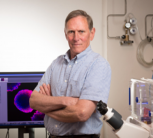Two University of Pretoria (UP) researchers are among nine researchers in South Africa who have received funding grants from the South African Medical Research Council (SAMRC) as part of the Strategic Health Innovation Partnerships (SHIP) programme. The grants are worth approximately R3 million each and are to be used over a three-year period.
Professor Robert Millar and Dr Iman van den Bout, academics and researchers of the Centre for Neuroendocrinology in UP’s Faculty of Health Sciences, have received funding to support their research into cutting-edge solutions for the diagnosis and treatment of prostate cancer and breast cancer respectively.
Professor Tiaan de Jager, Dean of UP’s Faculty of Health Sciences, said he is delighted that two researchers from the Faculty are part of producing such important work. “At the Faculty of Health Sciences, we pride ourselves on using our research to solve today’s pressing issues in the communities we work and live in. Additionally, I am proud to hear that our Centre for Neuroendocrinology has received two grants of about R3 million each which will go into finding innovative and lasting solutions to the current challenges facing the diagnosis and treatment of cancer in SA.”
The announcement was made today (8 Feb) at a virtual ceremony. The MRC SHIP is a partnership between the SAMRC and the Department of Science and Technology that funds and manages innovative projects focused on the development of new drugs, treatments, vaccines, medical devices and prevention strategies. This partnership provides life-saving innovations to the health industry and the South African public through involvement in developing new and improved treatment options.
An A-rated scientist with over 450 peer review publications, Prof Millar will continue his lifelong work by using the grant to test a new way to diagnose and stratify prostate cancer among South Africans, using a 'liquid biopsy' to improve outcomes.
“In South Africa, the age-standardised prostate mortality rate is one of the highest in the world. There is currently no systematic prostate cancer screening program in South Africa within the state-run healthcare system,” Professor Millar explained. “The standard diagnostic test for prostate cancer in South Africa consists of digital rectal examination and prostate specific antigen (PSA) and sometimes prostate biopsy. These tests are, however, characterised by high false-positive and false-negative values, leading to under- and over-diagnosis and consequent harm to patients, and increased costs to the healthcare system. My aim is to show that by utilising the novel state-of-the-art non-invasive genomic technology quantifying tumour mRNA in blood, PROSTATest and NETest, in South African black men, we can improve diagnosis and treatment selection and reduce costs to the healthcare system. Importantly, these tests have demonstrated the potential to identify new therapies for advanced prostate cancers which are not responsive to the major treatment – androgen deprivation therapy – thus addressing the SHIP call for a ‘pharmacogenomics approach to failed therapies.’”
For Dr van den Bout this project forms part of work that began 20 years ago. He will use his grant to initiate and develop the first breast cancer organoid biobank, which will be used to develop better prediction tools for South African women's response to standard chemotherapy regimens offered in the public health system.
“As I keep developing the project, I feel very strongly that this project will establish a resource and knowledge base that will be of immense value to local cancer scientists in their quest to improve breast cancer patient care in our country,” Dr van den Bout said. “It is already known that a significant percentage of African breast cancer patients that are treated with the standard chemotherapies available in the public health system fail to respond well. In this study we seek to develop a way to test living cells from the tumours of these patients for their reaction to the therapies in the lab, and to see if this will predict how the patient will respond to the treatment. Eventually, we hope that our research will lead to clinical tools with which we can assess each incoming breast cancer patient to determine what therapies will be most effective for them.”
Professor Tawana Kupe, UP Vice-Chancellor and Principal, said the two researchers embody UP’s vision of being the leading research-intensive university on the African continent. “Cancer in South Africa and on the African continent remains one of the most devastating diseases. I am proud that two of our researchers are leading the quest to find lasting and more effective solutions in the diagnosis and treatment of breast cancer and prostate cancer. It proves that at UP, we are committed to producing research that is relevant, innovative and that will improve the lives of ordinary people across Africa and the world.”
Watch the video in the sidebar to learn more.
Prof Robert Millar
February 9, 2021

 Story
Story
University of Pretoria (UP) researchers have found that the antioxidant content of certain types of tea can be likened to that found in recommended portions of fruit and vegetables.
 Infographic
Infographic
Half a cup of black tea, oolong tea or green tea contained the same amount of antioxidants with radical scavenging capabilities (RSC) as that of a 200mg vitamin C tablet.
 Story
Story
Researchers at the University of Pretoria (UP) may have identified the gene that is responsible for diet-related obesity. By exploring the role of the novel gene Slc7a8, they have made a potential breakthrough in current knowledge about the cellular mechanisms that drive fat accumulation. This understanding is crucial in developing effective treatments.
Copyright © University of Pretoria 2025. All rights reserved.
Get Social With Us
Download the UP Mobile App